

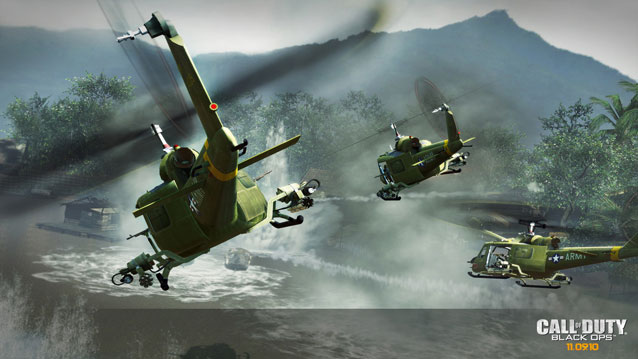
Gameranx: Did the idea that Black Ops could become a major player in pro gaming influence how you designed the game at all?
David Vonderhaar, game design director, Treyarch: I think it's starting to have an influence about how you think about designing the game – rather than it had a specific influence. I think it's sort of important at a very macro level what the competitive or the pro circuit is even about. It was important to get a precense on the circuit. To show up. And then, once you're there, you can really start to put a picture together about what that even looks like or how it even begins. So indirectly, it does on a day-to-day basis, but directly, on Black Ops? Necessarily, no. But you've got to start somewhere, and getting here is the first step, and we're here.
Pro gaming presents an interesting design challenge in that radical re-invention of your game from sequel-to-sequel probably isn't the best idea. After all, that'd be like randomly adding hockey sticks to basketball. So sort of awesome, but super disorienting. How do you continue to iterate and upgrade what's essentially a sport while continuing to keep things interesting for people who just play for fun?
To be really honest about, from time-to-time, you're going to have to go in and upset the apple cart to keep innovating. So I'm not terribly afraid of that. It's certainly something you talk about a lot. I mean, it's this thing that millions of people love and play every day. If you don't innovate, then you might lose those players. But if you innovate too much, you might lose the thing that they like. It's a very difficult balance that gets discussed a lot to make the best decisions there.
Broader than that, though, you've got the pay-offs and fun of the game that, in a way, somewhat conflict with the goals of “competitive and balanced.” You need the game to be Nuketown 24/7 – chaos and balanced – and then this [competition]. The holy grail is to put these things together in a way that makes sense. I believe that goal is attainable, but it's a long-term goal.
Do you think pro gaming has the potential to become as big as mainstream sports? If not, what's standing in its way? If so, what needs to happen in order for it to grow to that size, and will it even be good for the pro gaming scene?
It's really early days for me, so I'm still forming an impression about that in general. So here's what I would say: the potential of anything is limited only by the people who are doing it. How does anything go from being small and niche-y to large and big? Could the MLG – or any competitve league for that matter – have the massive scale of something else? Why not?
What's standing in the way is a much tougher thing. I'm not an MLG expert, but what I could tell you is, games are getting bigger. Online games are getting bigger. The number of people who buy them is getting bigger. The MLG itself is getting bigger. What's to say we can't just keep going with that and continue? So I think it's completely possible.
Black Ops now holds the record for the biggest entertainment launch of all time. Do you think that – this time around – you've finally emerged from Infinity Ward's shadow? What do you think you've done that really distinguishes your game?
I definitely feel like Treyarch's found its voice with Call of Duty: Black Ops. But I think the most important thing I could really ever tell you about that is what you do with that – where you go with that. That, to me, is more important for sure than anything that's happened along the way to get there. All the rest of that is irrelevant.
I look at it this way: I've been at Treyarch since Call of Duty Big Red One, so I've been making Call of Duty games with Treyarch for a long time. And the studio is getting experience. It's making better games that are doing critically and commercially better. And as long as we keep trending in the right direction, then we're doing what we need to do. Things start small and have to grow. That's really all we think about.
There's an odd divide between the 73 trillion human beings who purchase Call of Duty games every year and the disenfranchised hardcore gamer crowd that, well, still buys your games, but they're not happy about it. What do you say in response to people who think the Call of Duty formula is growing stale? Or that the franchise is “playing it safe”?
I would say that's not really accurate to begin with. There's innovation all the time in the franchise. The game does innovation year-over-year. There's some very direct examples of that happening. Wager match is an innovation on free-for-all. We hadn't seen any changes in free-for-all in years, right? Community tools like the theater are innovations over things that have never been done before. I would say that there's plenty of innovation, and then the next game will have some innovative stuff too. You can't look at any Call of Duty and say it was exactly like the last Call of Duty. Now the variances that it has may vary from game-to-game.
I don't disagree that we constantly need to be thinking about how to push the boundaries. And you've got to do it very, very carefully, because if we really weren't doing anything, then why would we keep doing better? It's not an accurate representation. So I appreciate that point of view, and I like to get that feedback. Those guys who've been with the franchise for a really long time are really important to the franchise. I wouldn't simply ignore that perspective just because there's been a lot of growth in the franchise. You have to bring both along at the same time. It's very complex and very tricky – something we talk about how to do successfully all the time.
On that note, I've seen a number of radically altered sequels flop and flop hard. In those cases, gamers said they wanted innovation right up until the moment they had it, basically. That in mind, do you think gamers really want massive innovation as much as they claim? Or is the game design process – at the end of the day – at its best when it's iterative?
The way that we think about the development process is that it is fairly iterative. I mean, you start with this concept, and by the time you're done, it's nothing like where you started. There are tons of examples of that even in Black Ops specifically. What the currency mechanic started off as and where it finished are very different things. And then it begot other things. Like, wager matches were sort of indirectly a result of the fact that it'd be fun to gamble currency, and then what does that look like? You go in with really solid principles that you're trying to communicate. You go in with these pillars of things you want to do. And sometimes you come back.
That's why there are both contracts and challenges in Call of Duty: Black Ops. Here's a different take. Contracts have a lot of similarity to challenges, but there's still this aspect of challenges too. So yeah, you're definitely taking a step and taking a step back. Take three steps forward and one step back. And over time, you can push the whole thing in the right direction. As long as you're doing that, you should be pretty happy. We were.
Do you think modern and pseudo-modern war shooters are at risk of becoming played out? It seems like everybody's making one these days, and the cynical gamer peanut gallery's starting to get a bit rambunctious.
I don't know. I'm sure for some people, that might be accurate. But I don't think holistically that's an accurate perspective. Ultimately, if the game is really fun and addictive, then the rest of that doesn't matter all that much. Look, it's not the first game we've made, and we've been gamers for a really long time. So I understand the hardcore point of view on these things. But, for every super hardcore guy who's got a perspective like that, there's somebody else who's coming around who hasn't played 17 games with modern settings.
So it's about perspective and having perspective. Those guys are forward-thinking. They've been around a long time. Their prediction of this stuff takes a lot more time than they have the patience to even discuss. So is it stale? No, it isn't stale. There's nothing factually to support that point of view. But it doesn't make their point of view wrong. It's just a perspective. They're ahead of where the people who aren't that hardcore are. We love the hardcore. You know, you've got to be a pretty hardcore dude to know about some of the stuff that goes on in publications like yours and others. That's a group that it'd be a mistake to not be aware of their perspective. And we are. But it's an influencer – not a decision-maker. It's an influence, and we'll make great decisions off that influence.

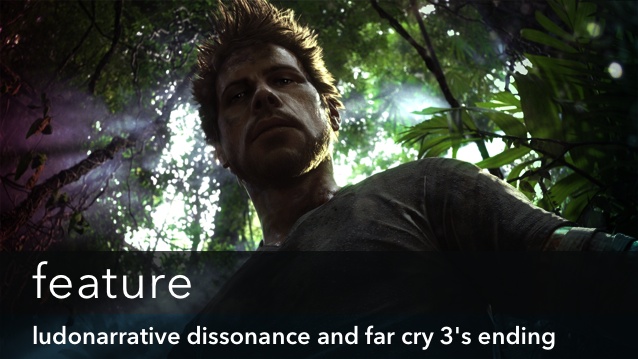
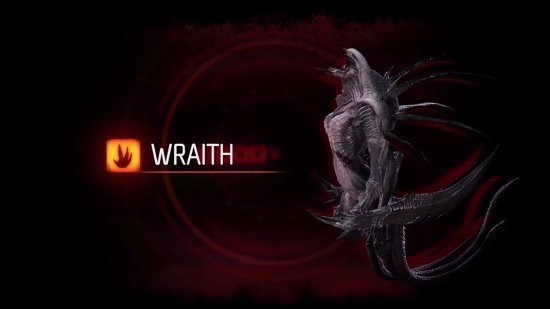

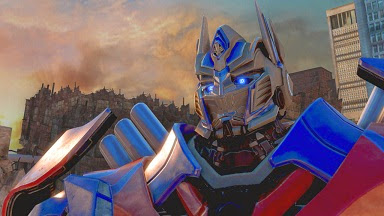 Transformers: Rise of the Dark Spark PS4 Cheats
Transformers: Rise of the Dark Spark PS4 Cheats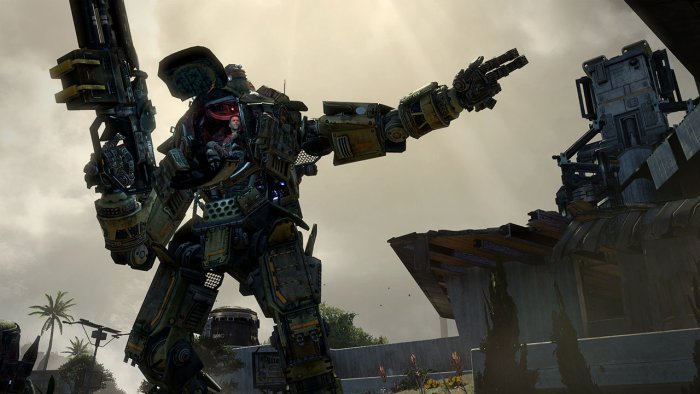 How to Easily Kill Titans in Titanfall
How to Easily Kill Titans in Titanfall How to get Far Cry 4 From A Distance Trophy / Achievement
How to get Far Cry 4 From A Distance Trophy / Achievement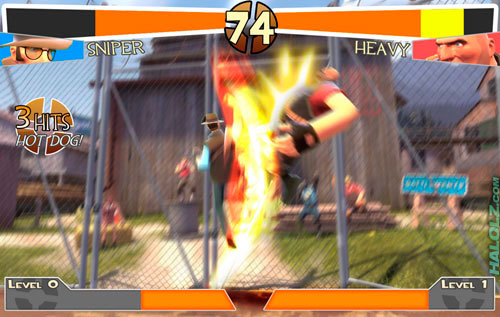 Capcom vs Valve
Capcom vs Valve Pay What You Want for 12 Great Apps with the 2016 Mac Bundle
Pay What You Want for 12 Great Apps with the 2016 Mac Bundle